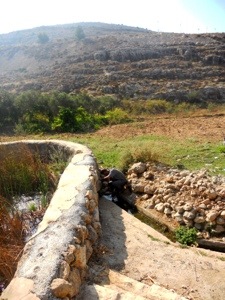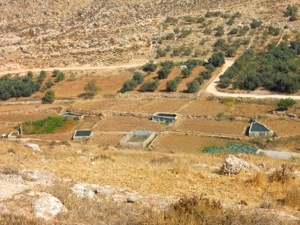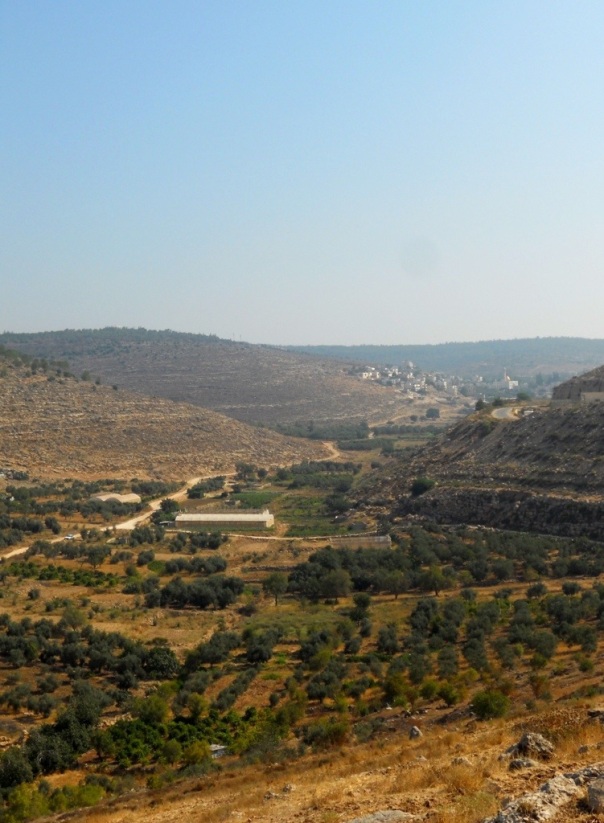Wadi Foquin: “On this earth ~ Ala hadhihi al-Ard”
August 17th, 2013 // 1:00 PM
Wadi Foquin village is located about eight kilometers to the west of Bethlehem and less that one kilometer from the Green Line (the internationally recognized border between Palestine and Israel). The village has approximately 1200 residents, and is famous for its grapes, almonds and olive oil, crucial to the villagers’ local economy. The semi-mountainous landscape also provides them with the land they require for grazing animals, particularly sheep.
Yesterday morning I was lucky enough to make a trip out to Wadi Foquin. In a valley between two peeks, Wadi Foquin is surrounded on the one side by the neighboring Israeli settlements, Hadar Betar and Betar Illit, and just past the Green Line on the other side lies the Israeli town of Mevo Betar. The Applied Research Institute of Jerusalem states: “The close location of Hadar Betar and Betar Illit to the 1949 Armistice [Green] Line and their proximity to the Israeli town Mevo Betar on the other side of the line make these settlements likely targets for formal annexation to Israel in the future.”[1] The ever-increasing rate of confiscation of villager-land by the settlements certainly supports this statement, with the settlements having already confiscated more than 12% of the villager’s territory. (In the below images you can find the depiction of continued construction of settlements encroaching on the village).
I had heard a great deal about Wadi Foquin in Sacramento, especially this past April when the “Friends of Wadi Foquin” were invited by the Lantos Human Rights Commission to submit a proposal for a briefing on the human rights abuses in Wadi Foquin. (“The mission of the Lantos Human Rights Commission is to promote, defend, and advocate internationally recognized human rights norms as enshrined in the Universal Declaration of Human Rights.”)[2]
A good summary of the human rights violations being committed agains the residents of Wadi Foquin daily can be found on the Change.org website (http://www.change.org/petitions/save-wadi-foquin-fukin). However, to witness striking and blatant evidence of these violations, the following one minute video (from just last month, in July 2013) records waste water from the sewage plant in Betar Illit being released onto the land of a local farmers in Wadi Fukin: http://youtu.be/4Sag2jozTPI
Walking through this land – a manifestation of the very roots of Palestinian existence on this earth – the words of Mahmoud Darwish kept cycling through my brain “On this earth, there is what deserves a life”. How could the existence of these villagers, and their heritage here – a genuine representation of all Palestinian people – be denied or negated in the face of such blaring evidence? I stood as a proud witness of this evidence: terraced hillsides constituting an agricultural system as old as time; an irrigation system based on flooding and gravity and a Roman well in the center of the agricultural territory still in use to irrigate the land; a local mosque, so old that it was in fact built upon a church constructed by Constantine’s mother, Helena, during her trip to the Holy Land in the 4th century AD, and later converted into the local masjid; an ancient Roman burial ground within the village territory, upon which no buildings are erected.
Before we departed from the village we went to visit the community center being renovated with the help of the Methodist Church’s presence in Palestine. There was no talk of human rights violations here, as young men worked energetically, piling bricks and mixing cement to construct a new wall and window for better airflow through community building. My friend, who has been working with Wadi Foquin for several years, say there is a new energy in the town now as a number of the youth of the wadi have been elected to the community council and are helping to rejuvenate and bring awareness to Wadi Foquin, both locally and internationally.
References:
http://www.poica.org/editor/case_studies/view.php?recordID=578
http://www.change.org/petitions/save-wadi-foquin-fukin
https://www.facebook.com/groups/459416990758113/files/

Roman cistern still in use to irrigate agricultural land, farmer adjusting the water flow for his day’s turn to water his land

Farmer’s water cisterns, sometime mixed with manure to prevent settlers from trespassing and swimming in them


